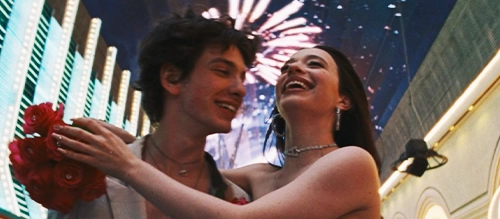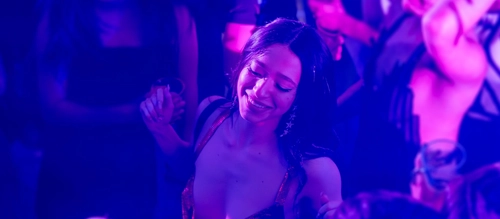
Anora (2024)
Director: Sean Baker
Screenwriter: Sean Baker
Starring: Mikey Madison, Mark Eydelshteyn, Yuriy Borisov, Karren Kragulian, Vache Tovmaysan
When it was announced that Sean Baker’s Anora had won the Palme d’Or at the closing ceremony of the Cannes International Film Festival in 2024, everyone cheered. Even before its somewhat unexpected win – many people had imagined that All We Imagine as Light or The Seed of the Sacred Fig would take home the prize – the film had already won the hearts of the public in Cannes. The award would determine that Anora would enter the history books as not only one of the relatively few films to win the prestigious award of Film of the Year, but that it would be the first by an American filmmaker since Terrence Malick’s The Tree of Life in 2011.
Anora opens in a nightclub where the titular character, Anora (Mikey Madison) – who goes by Ani for most of the film – works as a stripper. Because of her Uzbek-American descent and fluency in Russian, Ani’s boss fixes her up with some rich Russian-speaking clients, including Vanya (Mark Eydelshteyn), the son of a Russian oligarch. Vanya is on holiday in the United States and gets closer to Ani while spending his father’s money on gifts, parties, and drugs. Her very own fairy tale seems to come true when the couple elope, but complications arise when news of their marriage reaches Russia. While Vanya’s parents travel to New York, they enlist the help of Toros (Karren Karagulian), Garnick (Vache Tovmaysan), and Ignore (Yura Borisov) to get the wedding annulled. Made with a similar budget to Baker’s previous feature Red Rocket, but bigger in scope, this latest film is unsurprisingly driven by its characters, and exhibits a brilliant pace and exceptional thematic depth.
Much like in his previous movies, Baker has a very human and empathetic outlook on sex workers – while some may berate the characters for it, the film itself does not demonise sex work but rather seems to destigmatise it as a profession thanks to its humanistic portrayal. In true Baker fashion, Anora also explores how illusory and precarious the American dream is. Ani seems to have hit the jackpot when she marries Vanya: despite starting from virtually nothing, she has now climbed the social ladder to its very top. But, for someone who was not born into that money and prestige, nothing is secure: Anora poignantly shows how quickly all of this can be taken away, Ani judged and discriminated against for her profession, lack of historical wealth, and her consequential social status.
In a film that is so character-driven and, therefore, so reliant upon excellent acting, Mikey Madison is a tremendous standout as the lead. After her role as a supporting character in Quentin Tarantino’s Once Upon A Time in Hollywood in 2019, Madison is the star that shines the brightest in the entire film. While all the actors bring their best performances, exploring the multiple layers of each character, Madison steals every single scene she is in. It’s difficult to imagine anyone not gravitating towards such a human and emotional portrayal – it’s a true star-making performance.

The second half of the film is better paced than the first: it is practically impossible to take your eyes off the screen from the moment the three Russian men enter the narrative. With the threat of the annulment, the stakes are higher than ever, propelling Anora forward, ensuring it flies through its runtime. It is also an incredibly immersive experience, with every shot being beautifully photographed, encouraging us to enter the world of the film. A lot of this second part is also, however, somewhat predictable. It remains a joy to watch thanks to its beautiful cinematography and deft use of comedy, but doesn’t subvert expectations or wow in the way many of its fellow Palme d’Or winners have.
Anora is, therefore, not without its flaws. In addition to its predictability, too little comes of loose threads connected to Ani’s sexuality, or to her own insecurities regarding letting others in. Instead, Ani is presented as the sexual being of Anora, and often little else. Finding another way to showcase genuine intimacy could have potentially been a lot more powerful, and therefore successful in portraying Ani as a fully-fledged character who can make her way into the world without always circling back to her identity as a sex worker. From a narrative point of view, some of the other characters could have also been explored more thoroughly. While Anora focuses primarily on Ani, it would have been nice to see more depth given to the supporting cast given that they have such important roles in the film.
Overall, Anora is a powerful film with an incredible lead performances that supports its sometimes-flawed narrative and fascinating cinematography. Is it Baker’s best movie? Perhaps not… but it is a Sean Baker film through and through.
In a year in which the Cannes jury was headlined by American filmmaker Greta Gerwig, it seems fitting that an American filmmaker with a uniquely American tale – one with an apparent feminist perspective – was awarded the world’s grandest filmmaking prize. And, given its unapologetically open-minded approach to an often derided profession, it can be considered important regardless of whether it comes to be considered deserving of its Palme d’Or or not.
Score: 20/24

